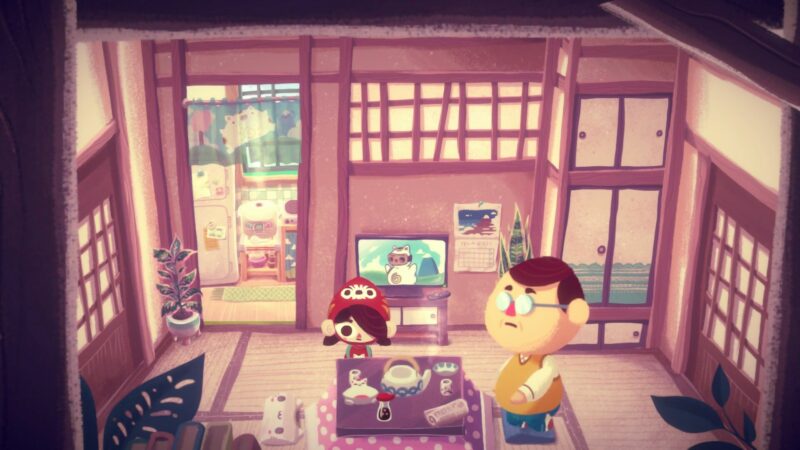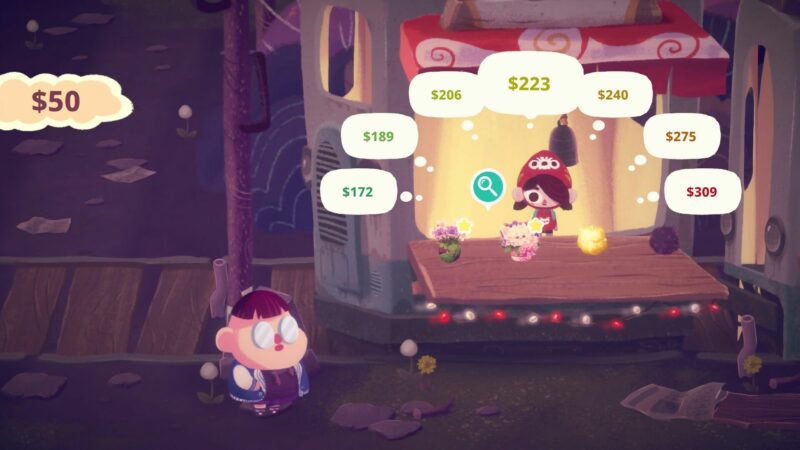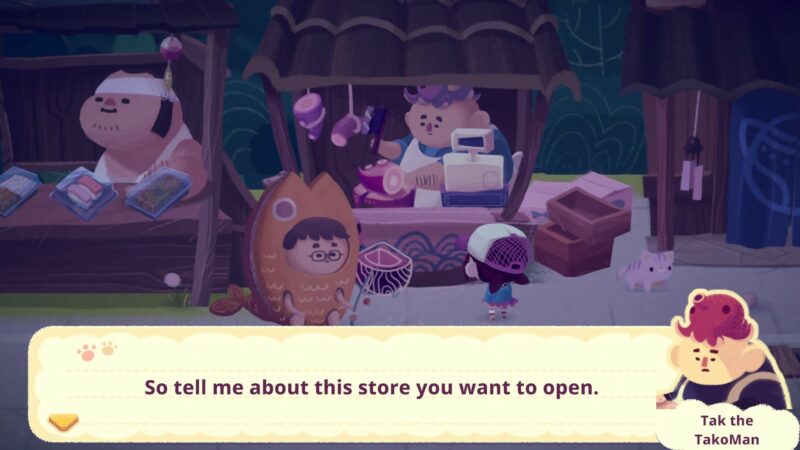
Whimsical, cat-based life sim Mineko’s Night Market looks lovely – but sadly, it offers a thankless grind dressed in a cosy costume. Here’s our review:
Early on, Mineko’s Night Market reminded me of Konami’s Goemon series, or The Legend Of The Mystical Ninja as it’s known in the West. Its rural setting is dotted with colourful Japanese cultural markers, from twangy folk music on the title screen to scatterings of lanterns and cat statues. A few hours later, however, it reminded me of a very different work – Lars Von Trier’s biting avant garde drama Dogville. And frankly, that’s not ideal in a supposedly cosy life sim.
When the diminutive Mineko first moves to a remote island village with her father, it initially feels like the kind of place you could really belong, even if it’s clearly seen better days. The pastel shaded homes and paper cutout trees exude a soothing essence. The people seem at least pleasant, at most warmly hospitable. Sure, there are mysterious black-suited agents hanging around nearby, caging cats, but they’re little more than bumbling idiots, easy to creep round or distract so you can liberate their feline prisoners.
As this scenario suggests, Mineko’s Night Market sets a winningly silly tone. And the Night Market itself, which pops up every Saturday, only adds to the levity with its featured events, kicking off in the first week with a cat race around the stalls. Yeah, cats feature a lot. There’s also able support from a silly script that’s likely to reap its share of chuckles. The mother of the first friend you make, Bobo, introduces herself as “Bobo’s mom.” But what’s her actual name? No, it really is Bobo’s mom. “Lucky for me I ended up having a child named Bobo,” she adds.
Name aside, Bobo’s mom is generous too, and gives you a crafting bench for assembling flower arrangements that you can then sell at your own market stall. So you pick flowers around the village or the gardens, bind up bouquets, and make a nice little profit, and all seems well with the world. Fast forward a couple of in-game weeks, though, and you may be less enthused. Behind the bright façade, Mineko’s Night Market reveals itself to be a game about hard manual labour, and not a short one, either.
In the days between each Saturday night, you spend much of your time gathering materials. Pick flowers, chop trees for paper or wood, fish at the local docks, chip away at rocks in dark caves. Each morning you get up, catch the bus to commute to your job of choice, then collect as much stuff as you can before your hunger meter empties (or you can buy food to refill it and prolong the agony). Then head home, do some crafting and flop into bed.
Don’t expect much from the new friends you’ve made, either. Once the villagers get a sniff of the idea that you might be the kind of sucker that likes to do favours, they want nothing else from you. They demand goods that you have to farm, craft or purchase, which on delivery level up a relationship meter. To acquire what they want, you’ll also need new craft benches, for things like paper, fabrics and gems, along with tools from the hardware store that open up new areas, all of which must now be purchased at substantial cost.

Instead of placing all the fruits of your labour into your rickety shack or crafting trinkets for your market stand, there’s this constant pressure for you to give half of them away if you want any kind of human interaction, like a kind of friendship tax. And your reward for handing out these freebies to people who simply loiter around the village doing nothing all day? More crafting recipes, so you can satisfy more requests.
In short, communal life in the game’s ‘cosy’ micro-society is entirely transactional. This rural life, as far from the rat race as you could imagine, is as ruthlessly capitalistic as any centre of global trade. More depressingly, the entire economy rests on Mineko’s young back, and the winking in-jokes about how everyone always expects you to do their chores lose their fizz against a backdrop of child labour, no matter how charming the presentation. The place and its people remain in absolute stasis unless you head out to work the fields. Even the market’s fortunes are linked to your own success as a seller.
So yes, Dogville. Mineko’s Night Market gets nowhere near the darkness and depravity of Von Trier’s film, of course, but they share the sinister sense that the people feel you owe them for tolerating your presence and that you’re there to be taken advantage of. Despite all the folks around, Mineko’s life comes to feel like a lonely existence. Nobody really talks to you, not even your own father. True, life sims often have an issue with placing economics over community, but Mineko’s Night Market appears to want to make a point of it, to want you to suffer a certain indignity.

This feeling is never less clear than in the acts of collecting, chopping and crafting themselves, which seem to have been made intentionally mindless. Many such exercises are based around micro-games: hold then let go of a button at the right time to chop a tree. Press the indicated directions on the stick to fold paper correctly. Now do it over and over in a rhythm, like on a production line. The fishing game, in which you wait (and wait) then press a button when the fish grabs the bait, must be the dullest recreation of angling in gaming history – almost as tiresome as the real thing.
These facile interactions beg a question – where’s the entertainment supposed to be here? To get out of bed in the morning is to face another day of drudgery, as you try to recall all the stuff everyone wants and what you need to make certain recipes or save up for the next workbench to slave over. In fairness, you might argue that all the mechanical simplicity points to a game aimed primarily at children. But then, if kids are looking for ways to experience being exploited for labour, Roblox has already cornered that market.
That the routine is occasionally broken by moments of intrigue – the plot involving those agents and a cat spirit named Nikko, the Night Market itself – doesn’t save Mineko’s Night Market from becoming a largely joyless affair. Like a bad job, letting your hair down on a Saturday night out at the end of a gruelling week doesn’t make it all worthwhile.

Highlight
The market itself offers a colourful, happy respite from the routine. There’s catharsis in overcharging the villagers for your wares, for one, but it’s also pleasurable to check out new stalls that emerge as folks move to the area, then take part in the grand events – races, parades – that cap the evening.
Verdict: 43%
Mineko’s Night Market’s tedious labour is hard to swallow, no matter how sweet the sugar coating.








